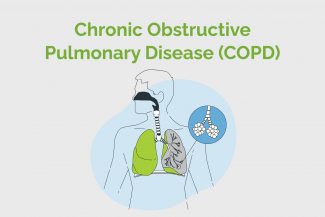Chronic Obstructive Pulmonary Disease (COPD) is a condition commonly referred to as “smoker’s lung” as tobacco smoke is the most common cause of COPD. It is also known as Chronic Obstructive Lung Disease (COLD). The World Health Organisation (WHO) estimates COPD to be at 4th place in the list of diseases causing death. It affects 9-10% of adults aged above 40.

What causes COPD (Chronic Obstructive Pulmonary Disease)
Smoking tobacco is the most common cause of COPD. Other factors such as air pollution and genetics play smaller roles. Typically these exposures must occur over several decades before symptoms develop.
- Smoking tobacco - This is the most common cause of COPD. Twenty per cent of smokers will develop COPD. Among lifelong smokers, about half will develop COPD. Women are more susceptible to the harmful effects of smoke than men.
- Air pollution - In developing countries, a common cause of COPD is poorly ventilated indoor cooking fires that use coal or biomass fuels such as wood and animal dung. These create indoor air pollution, causing COPD.
- Occupational exposures - Intense and prolonged exposure to workplace dust, chemicals and fumes increase the risk of COPD in both smokers and non-smokers. Industries and work places associated with COPD are coal mining, gold mining, cotton textile industry, occupations involving cadmium and isocyanates, and fumes from welding.
- Genetics - are known to play a role in the development of COPD. The disease is more common among relatives of those with COPD who smoke than smokers who don’t have COPD in the family. It is caused by the deficiency of alpha -1-antitrypsin, a protein produced in liver. This genetic change is associated with deficiency of lung function.
Are you at risk of developing COPD?
Yes, if you
- Smoke
- Have a relative with COPD
- Have asthma and airway hyper-reactivity. Airway hyper-reactivity means an increased response to a normal situation. The symptoms of airway hyper-response include shortness of breath, cough tightness after inhaling a triggering agent. There is evidence that those with asthma and airway hyper-reactivity are at increased risk of COPD.
- Live in a cold place. Cold temperatures or the winter months are known to exacerbate COPD.
- Live in a polluted environment
- Suffer from malnourishment. Decreased body weight reduces immune status, which further destroys the airways.
Changed
30/Nov/2020
Community
Condition














